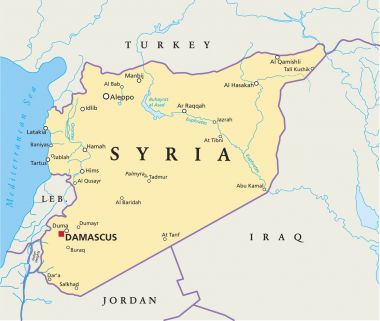
Christians in Syria are on alert after a Christmas tree in Suqaylabiyah was set on fire, triggering protests.
Footage showed masked individuals pouring an unidentified liquid on the tree on the eve of Christmas, although it was unclear if they were attempting to extinguish or fuel the fire, media reported.
Later videos revealed a religious leader from the governing HTS group addressing the crowd in Suqaylabiyah, assuring them that the tree would be repaired by morning. The leader then raised a cross as a gesture of solidarity, an unusual act for Islamist conservatives.
On Tuesday, protests intensified in response to the arson, spreading to areas of Damascus, the capital. Demonstrators in Damascus’s Kassa neighborhood voiced opposition to foreign fighters in Syria, chanting, “Syria is free, non-Syrians should leave,” in reference to those HTS claimed were responsible for the attack. In Bab Touma, another Damascus neighborhood, protesters carried a cross and Syrian flags, declaring, “We will sacrifice our souls for our cross.”
One protester, Georges, told AFP, “If we’re not allowed to live our Christian faith in our country, as we used to, then we don’t belong here anymore.” Syria is home to a diverse population, including Kurds, Armenians, Assyrians, Christians, Druze, Alawite Shia, and Arab Sunnis, the latter being the majority of the Muslim population.
Just over two weeks ago, rebel forces toppled Bashar al-Assad’s presidency, ending the Assad family’s rule of over 50 years. The governance approach of HTS, now in power, remains uncertain. Originally a jihadist group advocating violence to establish a state governed by Islamic law, HTS has recently taken a more pragmatic stance. Earlier this month, as fighters advanced on Damascus, HTS leaders expressed aspirations to create a Syria inclusive of all its citizens.
The new Islamic leadership in Syria faces significant challenges, including addressing the presence of foreign fighters, Islamist extremists, and remnants of the previous regime that might seek to undermine stability and target minorities.
Christians express cautious hope after end of Assad’s rule
Respond to the question what Christians thought of the fall of Assad’s regime, a Kurdish-Syrian Christian, whose name is withheld for security reasons, offered both his hope and concerns for the future.
“First, the answer is good news. In short, a single family has ruled Syria for more than fifty years, even though it is a republic and not a monarchy,” he said.
“Second, there are many detainees in Syrian prisons, which are not just prisons but human slaughterhouses. Thousands of people have died under torture. Others have lost their minds, and some have permanent disabilities regardless of the mass graves.”
Pointing to Saydnaya Prison, which he described as “one of the worst”, he said: “In the coming years, the victims who survived the prison will be revealed. The stories of the amount of brutality and violence that happened to the detainees are like science fiction. The mere fact that these prisons have ended is in itself joyous news.”
He cautioned, however, that there are still many unknowns and that the road to the future will be long.
“Does this mean that the Syrian war has completely ended and the problem is solved? Of course not,” he said, adding: “Because the upcoming political phase will face many difficulties, and there is an atmosphere of fear dominating the future of the Syrians. Just facing an unknown future is frightening in itself.
“The war in Syria has been ongoing for more than a decade. This means almost half a generation of Syrians knows nothing but war, and nearly two generations don’t know what it means to live in a democracy. This situation could lead to many conflicts over power and money in the country.”
Specific points of concerns for him are the future of minorities, freedom of religion, freedom to hold diverse political views and the freedom of women and their role in society. He also points to those who have been born outside of Syria and can no longer identify with the life in the country that is unfamiliar to them.
He also says that as a Kurd, he is concerned about the Kurdish areas in northwestern Syria that are still under the control of forces affiliated with Turkey.
“The Kurdish-Turkish conflict has not been resolved yet. If there are detainees and prisoners in the prisons of these groups in Afrin, then the liberation of Afrin and the return of the Afrinians to their homes means to me, as a Kurd from Afrin, that Syria hasn’t been completely liberated. Otherwise, Syria is only liberated from the Assad regime, the dictatorship.
“However, it is necessary to celebrate the liberation of Syrian regions from the Syrian regime and work together for Syria to be a country for everyone,” he adds. “Syria for Arabs, Kurds, Muslims, Christians, Druze, and the rest of the Syrian people.”